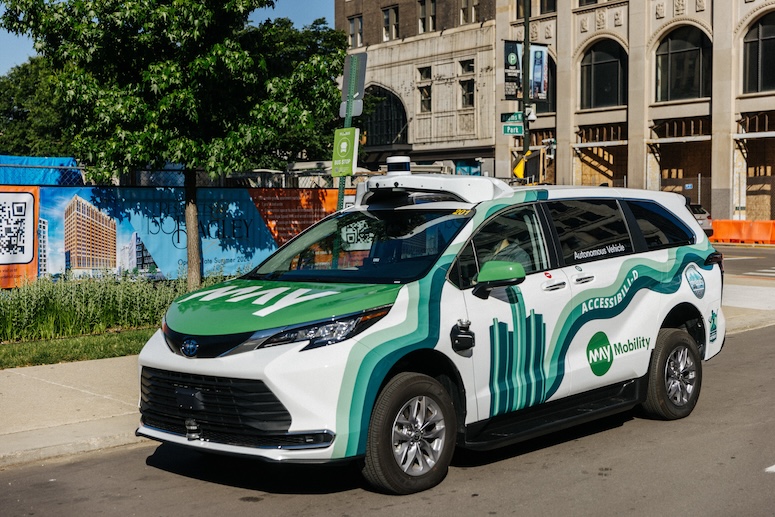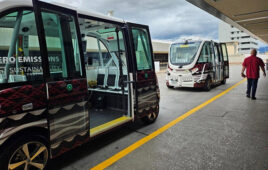|
Listen to this article
|
May Mobility is launching a robotaxi pilot program in Detroit for people with disabilities age 62 and older. The service will be available to select residents of Detroit starting from June 20, 2024 through 2026.
May Mobility will deploy three robotaxis, including two wheelchair-accessible vehicles, to help participants achieve greater access to healthcare facilities, shopping centers, jobs, and social and recreational activities. The free service will operate across 68 stops in 11 square miles of downtown Detroit Monday and Wednesday through Friday from 8 a.m. to 6 p.m. and on the weekend from 8 a.m. to 1 p.m. Persons interested in riding the service must submit an interest form and will be contacted to enroll.
While all of May Mobility’s robotaxis are autonomous, they do have human safety drivers behind the wheel to provide customer service and monitor vehicle operations. May Mobility told The Robot Report human operators also provide educational support for people who may have questions before they can feel comfortable getting into an autonomous vehicle, support and to help riders with various accessibility needs.
“Many Detroiters have trouble getting around due to the costs of owning a car or mobility challenges arising from age or disabilities,” said Edwin Olson, CEO and co-founder of May Mobility. “We’re excited to show how autonomous technology can help in Detroit, where we will be launching our largest service area to date.”
Last July, the Detroit City Council unanimously approved a $2.4 million contract with May Mobility to provide this service. May Mobility performed extensive vehicle testing with the University of Michigan’s Mcity and the American Center for Mobility (ACM) in preparation for launch. Testing protocols included the Mcity Safety Assessment Program, made up of a Driver’s License Test and Driving Intelligence Test, and a testing and evaluation process developed by ACM that simulated genuine scenarios encountered in urban settings like Detroit.

May Mobility’s Accessibili-D autonomous vehicle
May Mobility’s autonomous vehicles use its Multi-Policy Decision Making (MPDM) technology to navigate city streets. Each vehicle is equipped with multiple lidar, radar and cameras that feed MPDM a 360-degree view of its surroundings. Using the data collected from the AV’s sensor suite, MPDM can simulate thousands of possible scenarios every second. As the AV detects vehicles, pedestrians, bikers and pets, MPDM analyzes the best maneuver to perform to efficiently and safely reach its destination, even in unencountered situations.
“We’re thrilled to launch the ‘Accessibili-D’ autonomous shuttle service, a vital step toward enhancing mobility for our older residents and those with disabilities. This free, innovative service will provide safe and efficient transportation, greatly improving access to essential services for residents who have faced difficulty navigating their needs in the city,” said Tim Slusser, chief of the Office of Mobility Innovation at the City of Detroit. “We are thankful for the expert collaboration of the institutions and individuals at the Michigan Mobility Collaborative and May Mobility for their invaluable partnership. Together, we’re making Detroit a more inclusive city for all.”
In December 2023, May Mobility deployed robotaxis at a retirement community in the Phoenix metro area. Two autonomous minivans were made available to a select group of early riders who live in Sun City, a retirement community home to 39,931 people, according to the 2020 census, which is about 14.4 square miles in size. To start, May Mobility said its minivans will cover about 4.5 miles of Sun City, bringing the early riders to a variety of spots such as resident buildings, medical centers, and “other key locations.”
The pilot in Detroit is May Mobility’s 14th deployment to date. The company also currently operates in Ann Arbor, Mich.; Grand Rapids, Minn.; Miami, Fla.; Arlington, Texas and Sun City, Ariz.






Tell Us What You Think!